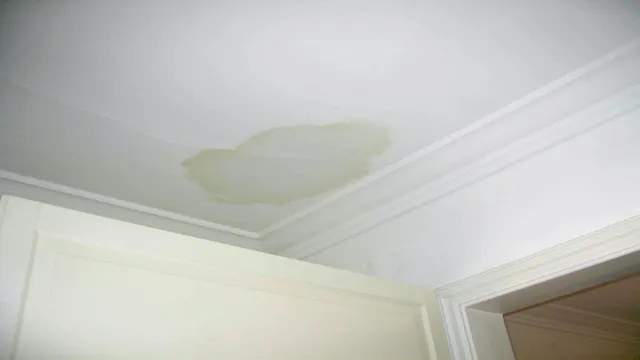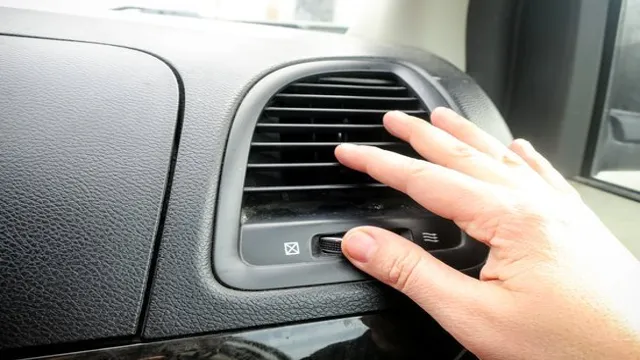Do you suspect that your air conditioning system may be the cause of the water stains on your ceiling or the sudden appearance of ceiling leaks? It’s not uncommon for homeowners to blame their AC units for causing ceiling leaks and water damage in their homes. The question is, can AC cause ceiling leaks? The answer is that it depends on a few factors. In this blog, we’ll dive deeper into this concern and what you can do to prevent it from happening.
So, keep reading to learn more.
Understanding Possible Causes
If you have an air conditioning unit installed in your home, it is possible for it to cause a leak in your ceiling. One possible cause is that the AC unit’s condensate drain line is clogged or damaged, leading to water buildup that eventually overflows onto your ceiling. Another potential cause could be a refrigerant leak, which can create excess moisture that also results in water damage to your ceiling.
Additionally, faulty installation or incorrect unit sizing can result in improper drainage, leading to potential leaks. It’s important to address any signs of water damage on your ceiling as soon as possible, as delays can worsen the problem and lead to mold growth or structural damage. Regularly scheduled maintenance and inspections of your AC system can help prevent these issues and ensure proper functioning.
Condensation Buildup from Poor Insulation
Poor insulation can lead to condensation buildup in your home, which can cause a host of problems. There are a few potential causes of this issue, which is often seen in colder months. One possible culprit is the presence of warm, moist air inside your home, which can condense when it comes into contact with a cold surface.
If your walls, windows, or roof are not insulated properly, they may cool down enough to trigger this reaction. Another potential cause is ventilation issues. If there isn’t enough fresh air coming into your home, excess moisture can build up and lead to condensation.
This is why it’s important to make sure your home is properly ventilated, especially in areas like the bathroom and kitchen where moisture is common. Preventing condensation buildup is important not just to protect your home’s structure, but to maintain your family’s health as well. Mold and mildew thrive in damp environments, and can cause respiratory issues if left unchecked.
So make sure your insulation is up to par, and take steps to keep your home well-ventilated.

Faulty or Damaged AC Unit
If your AC unit is not working correctly, one of the most likely reasons is that it is faulty or damaged. There are various reasons why this could happen, including wear and tear, age, or lack of maintenance. Some common signs of a faulty AC unit include strange noises, unpleasant smells, and reduced cooling capacity.
If you notice any of these signs, it is best to call in a professional to diagnose the issue and suggest the necessary repairs. Neglecting the issue could result in more extensive damage, leading to higher repair costs. Just like a car, regular maintenance of your AC unit can keep it running efficiently and lengthen its lifespan.
Clogged Drain Line or Pan
A clogged drain line or pan can be a problematic issue for homeowners. The causes of a clogged drain line or pan can vary due to different reasons. The buildup of dirt, debris, mold, and other particles can lead to the clogging of drain lines or pans, causing dirty water to back up and overflow, which can lead to structural damage in the home.
Other factors that can lead to clogged drain lines include improper installation, mineral buildup, and tree roots. To avoid a clogged drain line or pan, homeowners should ensure proper maintenance of their plumbing systems, regularly inspecting and cleaning up the drains. A professional plumbing service can provide expert advice on how to prevent clogs and provide effective solutions for any existing issues.
With proper care, homeowners can avoid the frustrations of clogged drains and maintain a safe and healthy living environment.
Signs of Ceiling Leaks
If you’re experiencing a ceiling leak, you may wonder what caused it. One potential culprit could be your AC unit. While AC units are designed to keep you cool and comfortable, they can cause issues if there is a problem with the unit or its installation.
One way AC units can cause ceiling leaks is through condensation. As air passes over the cold evaporator coil, it cools and releases moisture. The water should drip into a pan and then drain away, but if there is a problem with the drainage system or the pan is damaged, water can overflow and cause damage to the ceiling.
So, the answer to “can AC cause a leak in ceiling?” is yes. If you notice signs of a ceiling leak, it’s important to address the issue as soon as possible to prevent further damage.
Water Stains or Discoloration on Ceiling
Water stains or discoloration on the ceiling can be a sign of a leak. If you notice a brownish stain or yellowish discoloration on your ceiling, it’s important to investigate and find the source of the leak. The problem could be something as simple as a loose roof shingle or a cracked pipe, or it could be something more serious like a roof leak or a burst pipe.
Either way, it’s important to take action quickly to prevent further damage to your home. The longer you wait, the more extensive and expensive the repairs can become. Additionally, if the leak is left unresolved, it can cause mold growth, which can pose health risks to you and your family.
Therefore, make sure to act fast when you spot water stains or discoloration on the ceiling, and call in a professional to diagnose and fix the issue as soon as possible. Don’t wait until it’s too late!
Dripping or Water Drops on Floor or Furniture
Ceiling leaks are one of the most frustrating and damaging problems homeowners can face. Signs of a ceiling leak may include dripping or water drops on the floor or furniture, brown stains on walls or ceilings, or even a musty odor in the room. If left untreated, these leaks can lead to serious structural damage and mold growth, which can pose health risks for you and your family.
The key to preventing and addressing ceiling leaks is to address the problem as soon as possible. This means identifying the source of the leak and taking action to repair it. While you may be able to fix some small leaks yourself, it’s always best to consult with a professional to ensure proper repair and avoid future problems.
By staying alert to signs of ceiling leaks and taking prompt action, you can protect your home and avoid costly damage.
Preventing Ceiling Leaks from AC Units
Yes, an AC unit can cause leak in the ceiling if it is not properly maintained or installed. This is because air conditioning units produce condensation as a natural byproduct of their cooling process, and if the condensate drain line is clogged or damaged, the water can overflow and start to leak through the ceiling. To prevent this from happening, it’s important to schedule regular maintenance for your AC unit and have a professional inspect and clean the drain line to ensure it’s working properly.
You can also install a secondary condensate drain pan to catch any excess water if the primary drain line fails. By taking these preventative measures, you can avoid costly water damage and prolong the life of your AC unit.
Regular AC Maintenance and Inspections
Regular AC maintenance and inspections are essential for preventing ceiling leaks from AC units. Over time, AC units can accumulate dust, debris, and other particles that can clog the condensation line or cause the drain pan to overflow. This can result in water dripping from the ceiling, damaging your property and posing a safety hazard.
By scheduling routine inspections and maintenance, you can ensure that your AC unit is functioning correctly and identify any potential issues before they become major problems. Additionally, it’s crucial to change your air filter regularly to prevent dust and debris from building up in the unit. By taking these simple steps, you can keep your AC unit running smoothly and prevent costly ceiling leaks.
Ensuring Proper Insulation and Air Circulation
Proper insulation and air circulation are crucial in preventing ceiling leaks caused by AC units. When an AC unit is improperly installed or maintained, it can cause condensation buildup that eventually drips onto the ceiling, leading to water damage. To prevent this, it’s important to make sure your AC unit is installed correctly and to regularly maintain it.
Additionally, it’s essential to ensure your attic space is properly insulated to prevent temperature fluctuations, which can also lead to condensation buildup. Good air circulation is also important in preventing condensation buildup, as it allows moisture to escape and prevents it from collecting on the ceiling. By taking these necessary steps, you can prevent ceiling leaks and avoid costly repairs in the future.
In Conclusion
In conclusion, while AC units do not typically cause leaks in ceilings, it’s always a good idea to keep an eye out for any signs of moisture or damage in your home. Remember: a leaky ceiling is never a cool way to beat the heat!”
FAQs
Can AC cause leaks in a ceiling?
Yes, it is possible for an AC unit to cause leaks in a ceiling if there is condensation buildup or a blockage in the drain line.
How can I prevent my AC from causing leaks in my ceiling?
Regular maintenance of your AC unit can help prevent leaks, including cleaning the drain line and ensuring proper insulation in the ceiling.
What are some signs that my AC is causing a leak in my ceiling?
Water spots or stains on the ceiling, dampness or mold growth, and a musty smell are all signs that your AC may be causing a leak.
Is it safe to continue using my AC if it’s causing a leak in my ceiling?
It is not recommended to continue using your AC if it is causing a leak in your ceiling, as it can cause further damage and potential safety hazards. It’s best to have a professional inspect and repair the issue.

